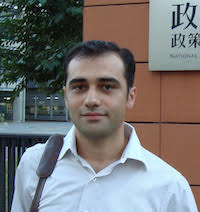 アナー・スレイマノフ
アナー・スレイマノフ
アゼルバイジャン共和国
税関委員会事務局長
Public Finance Program (’10)
Please tell us about your career path so far. What is your area of specialization and how did you come to work in this area?
First of all, let me take me take the courage to say that this has been a long journey. I have been in Customs Service for almost 15 years by now. This journey started back in 2006 when I was 23 and just about to finish my master’s degree program on customs administration from Baku State University. When I applied to Customs Service, I was working as an interpreter for the World Bank project on improvement of amelioration and irrigation systems that covered 12 regions of Azerbaijan. And as I passed exams on recruitment to Customs, I was offered a position at the very distant northern region of Azerbaijan, at the border with Georgia – a tough dilemma for me to leave a pretty interesting and better remunerated job with cozy office life at the very center of Baku for the border region in a completely new environment. When looking back at that changing moment of my life, I realize that the decision I made was correct and I feel very grateful for my family who supported me in taking that step.
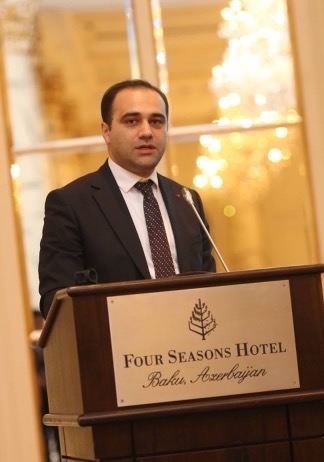
Presenting Customs Vision on Paperless Cross-Border Trade at Digital Trade Hub Conference in Baku, Azerbaijan, 2018.
From 2006, I started working in various positions in Customs, but mainly at the Department of Statistics and Information Technologies at the Headquarters – the center of customs innovations and know-how all along these years. My job there, and the great team I worked with led by true professionals, helped me to be part of several successfully implemented projects in the area of cross-border paperless trade, coordinated border management and others, including Customs Single Window – the first SW system in country by then.
From 2015, we shifted our orientation more towards Performance Measurement & Development Programs where I held various leading positions, building automated customs management systems that incorporated the work on introducing new customs performance measurement techniques as well.
In 2019 I was appointed to the position of the deputy chief of the Risk Management & Audit Department, a completely new direction, not only for me but also for my administration. Risk management problems have always entertained my mind and that new position has opened up new opportunities for me in terms of applying my professional competencies and strengths in building up new risk management architecture at strategic levels.
You are currently serving as Head of Secretariat at the State Customs Committee of the Republic of Azerbaijan. What are your main roles and responsibilities?
Well, the Secretariat is under the direct supervision of the Chairman of Customs Service. I have been posted to this position rather recently, and my primary task is to make the Secretariat the hub of customs policy making and to ensure quality performance all over the core customs business areas. In some points, it is a rather new dimension for me, especially in terms of protocol-related issues. But on the hand I feel I have a comparative advantage due to my experience and especially the knowledge I obtained in Japan. My responsibilities include, among others, studying and proposing customs modernization initiatives, applying new administrative systems and providing overall progress reports to the Chairman of Customs Service. Arranging high-level meetings, ensuring smooth communication with our partners from the government sector and trading community are among the tasks I am handling daily.
In your current capacity, what do you see as the main opportunities and challenges for Azerbaijan over the course of the next five to ten years?
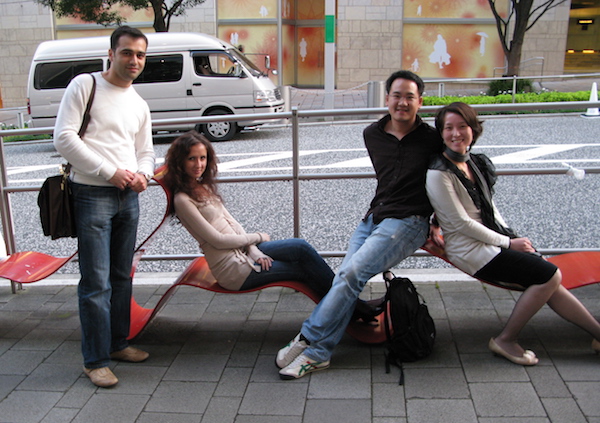
Relaxing with classmates Praveen Tantiyapong, Hu Zongli and Liuda Gorobey after classes at GRIPS.
When thinking about our future, it is very important to understand the past we are coming from, the values we cherished for centuries and the problems we encountered as a nation, especially in recent decades. Azerbaijan is, in some sense, very similar to Japan as it offers a very interesting blend of traditions and modernity. On the one hand, our country is home to very ancient and diverse cultures, different religions, a resources-rich nature and rich cultural heritage. On the other hand, not dwelling too much into history and details, we have built the first secular democratic state, granted universal voting rights to women, staged the first opera etc. in all Muslim East. I believe all these actually create an incredible opportunity for us to benefit from that synergy and to continue building a modern, dynamic and pragmatic political and economic system.
Nevertheless, in our recent history, especially after the collapse of the Soviet Union, Azerbaijan had to go through an extraordinary transformation and, one can say, emerged as a completely ‘new’ nation. This reminds me again very much of Japan which has always been very successful with its incredible skill to renew itself and embark on a course radically different than before. So, thinking broader, despite all the ups and downs throughout our history, I am feeling very positive about our future.
As for the challenges for next five to ten years, unfortunately today the most sensitive problem of our country is the conflict between Armenia and Azerbaijan and the fair call of Azerbaijan to settle the Nagorno-Karabakh problem. I think this conflict creates yet unknown risks not only for the conflict sides, but for our entire region.
Thinking in terms of customs administration, especially in the context of opportunities, I would like to mention the very aspiring vision of Azerbaijan to become a regional transit and logistics hub in the next five to ten years. Our government has taken serious policy measures to achieve that by creating a positive business and investment climate for the global trading community. In this regard, I would wish to see more active involvement of Japanese business in our part of the world.
What are some of the biggest challenges you face in your work? And what have been the most interesting or rewarding aspects of your career thus far?
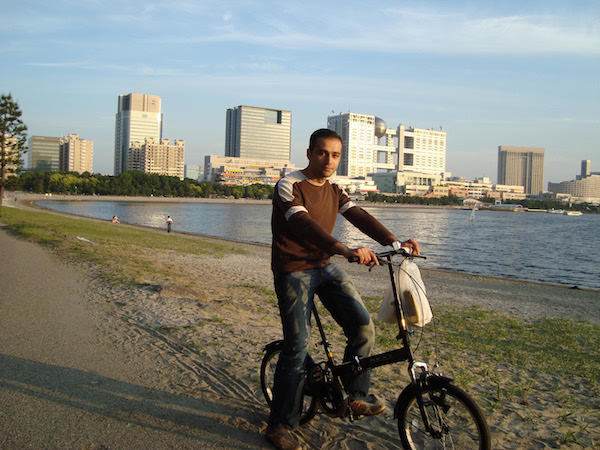
Wandering around the Odaiba waterfront.
The biggest challenge I face in my work is the incredible pace with which things change these days. We at Customs work very closely with the trade community and it is my feeling that Customs in any country always lags one step behind business. This becomes especially challenging when one day or another you find yourself immersed so much in your primary tasks, in so-called daily routine that you run the risk of losing sight of the bigger picture. This is exactly why even well-educated and trained staff needs all the time acquiring completely new skills and knowledge. To cope with this, I am trying to keep close to academia. I am delighted to say that I deliver lectures on customs administration at one of the biggest universities in Baku. This gives me an opportunity to interact with university professors and researchers, and more importantly with students who always come up with fresh ideas and open different perspective to problems long entertaining your mind. I also see this as a kind of social activity for myself where I can contribute to our society.
What led you to GRIPS? What was the most important thing you learned while here and how has your experience at GRIPS prepared you for future endeavours?
I came to know about GRIPS in a much unexpected way. I remember the day when our management informed me about the opportunity to study at GRIPS under the WCO scholarship. It was 2009, my third year at Customs, and I knew I needed better education. I will always feel grateful to the government of Japan for this life-changing opportunity for me and to all people who supported me all along this endeavor. If to put it very shortly, study at GRIPS has enabled me to execute my work confidently, competently, and with devotion all along these years. I recall with deep respect and joy all my professors and GRIPS staff as well as all my friends who are part of our GRIPS family.
Have you had any involvement, professional or otherwise, with Japan since your graduation?
After returning from Japan, I always tried to keep in touch with all my friends. With years, you start feeling that special bond even stronger. You keep on comparing almost everything surrounding you back in your country with what you learned and experienced in Japan. I believe this is exactly what makes me truly strong – mentally living somewhere in between Japan and Azerbaijan.
I am delighted to say that I am heavily involved in Japan Azerbaijan Alumni Association activities. At the moment we are in the process of getting organized better and I am happy that I have a chance to contribute to that process. We regularly arrange various events and just meet to share our memories. At a professional level, at Customs I have the chance to keep in touch with customs officers from Japan under various cooperation platforms.
Besides that, I am still practicing kana and kanji every morning before I start my work.
How do you maintain a balance between your work and the rest of your life? And what is your favorite thing to do when you are not working?
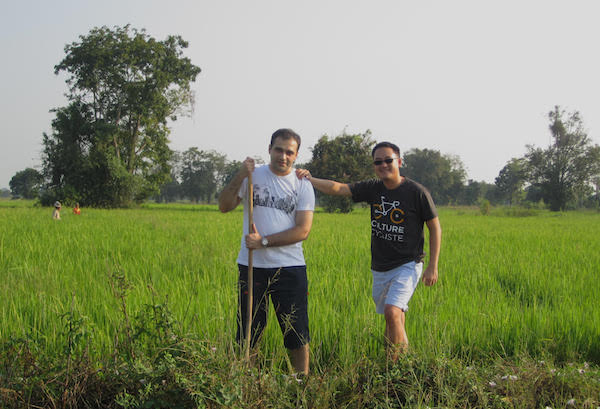
GRIPS, home to friendships for life. Anar with his GRIPS friend Praveen during a visit to Thailand in 2012.
These days, when free from work, I am trying to spend more time with my family. I swim and play soccer on a regular basis with friends. But what truly excites me is travelling. I always say to myself that if not Customs, I would make a great ethnographer. For me travelling is not about traversing the unknown lands, but about discovering the customs and habits of different cultures while feeling the touch of history.
What are some of your fondest memories of your time spent at GRIPS? And what do you miss about Japan?
It is the most difficult question. In fact, our life at GRIPS and in general in Japan empowers me to talk not only memories but whole stories. From among many, I would love to share one I will always remember.
It is a story about my bicycle – the first one in my life. We decided to purchase a bicycle with savings from our scholarship with my closest friend and classmate Praveen Tantiyapong from Thailand. We visited Don Quijote shop near Roppongi crossing and purchased two funny bicycles we could afford ourselves with the limited budget. But true adventure started after that as we decided to ride to TIEC in Odaiba where we used to live. That journey which usually takes only two hours by walk ended up with riding almost 6 hours as we did not have any navigation gadgets but a paper map completely in Japanese. I recall how bad and inexperienced I was with using Tokyo maps, misleading Praveen from the right direction all the time. But finally we made it, we did reach TIEC. Only with time we would discover shorter paths.
I believe this simple story describes very well the true spirit of what we as “gaijin students” experienced in Japan and at GRIPS. We did have certain difficulties but we still could enjoy what Japan and GRIPS offered. We learned to hold together to solve problems, to overcome “troubles” like sleepless nights before exams etc., but also to share our lunch with friends at the GRIPS backyard or at TIEC 5th floor lounge. I miss Japan and will miss it always – the Japan as we experienced it all together.
If you could give one piece of advice to anyone considering studying at GRIPS what would it be?
Well, first of all, they need to understand very clearly the central goal of GRIPS as hub of public policy making. GRIPS is the true center of academic excellence and its central goal is to cultivate future leaders especially in public sector. I believe this will help future students to understand their personal goals and role in their respective societies in a far better way and inspire them to benefit from every single second at GRIPS.
Besides, my small piece of advice would be also to spare time for learning at least a little Japanese before going and also while living in Japan. Being well aware of the tough schedules at GRIPS, I still urge future students to benefit from this chance to study Nihongo or other incredible things specific to Japanese culture.
How would you like to maintain involved with the School? What do you expect from GRIPS as an alumnus and do you have any suggestions on how to further utilize the GRIPS alumni network?
First of all, let me express my deep gratitude for providing me with the opportunity to be the Alumnus of the Month. I feel privileged to share my thoughts and memories with our GRIPS family.
As for networking, I believe a lot is already being done and I feel very grateful for that. The only request and suggestion I have at the moment is to consider improving GRIPS Gateway by adding a new section open for sharing academic research materials by alumni on specific fields after graduation.




